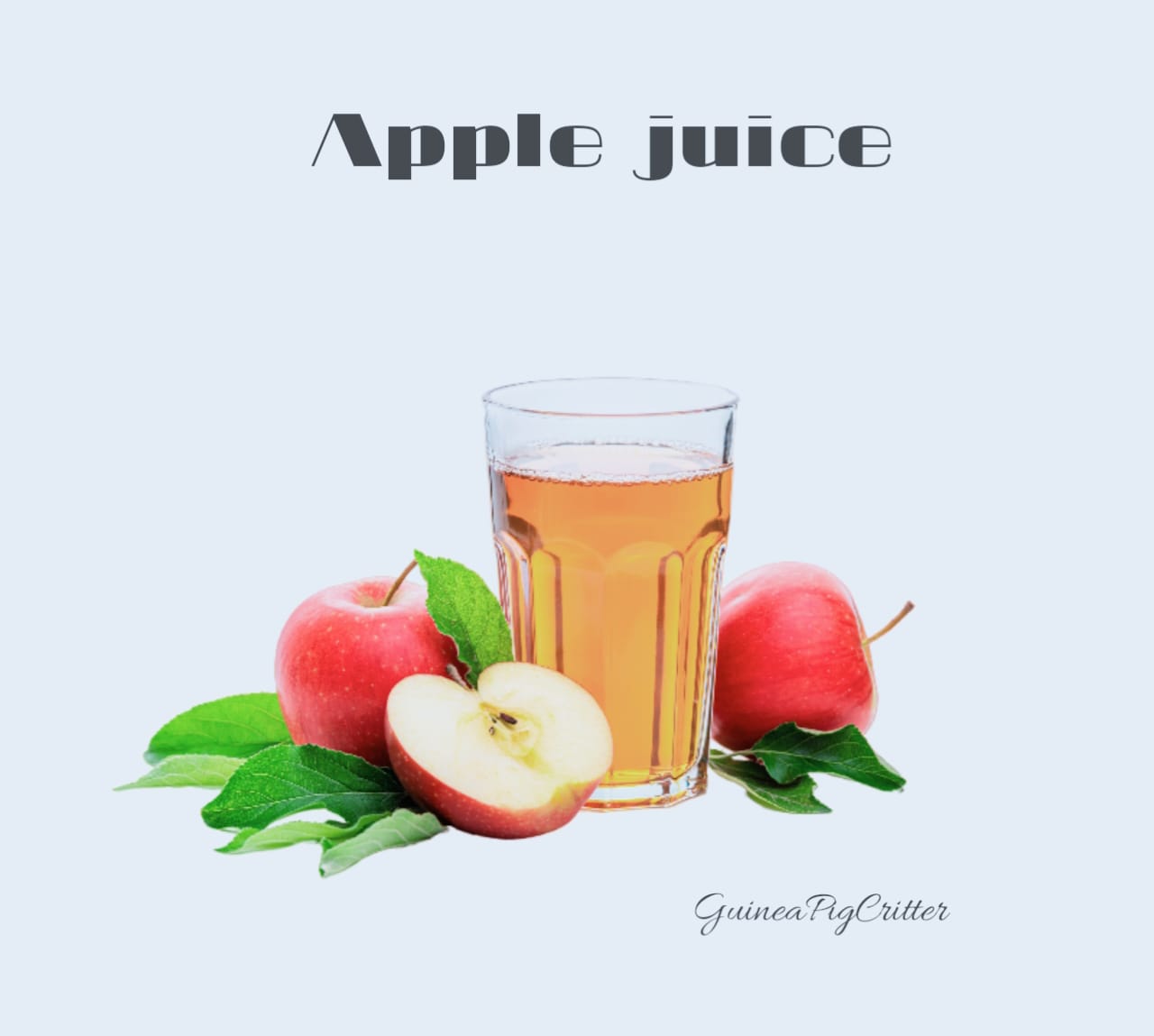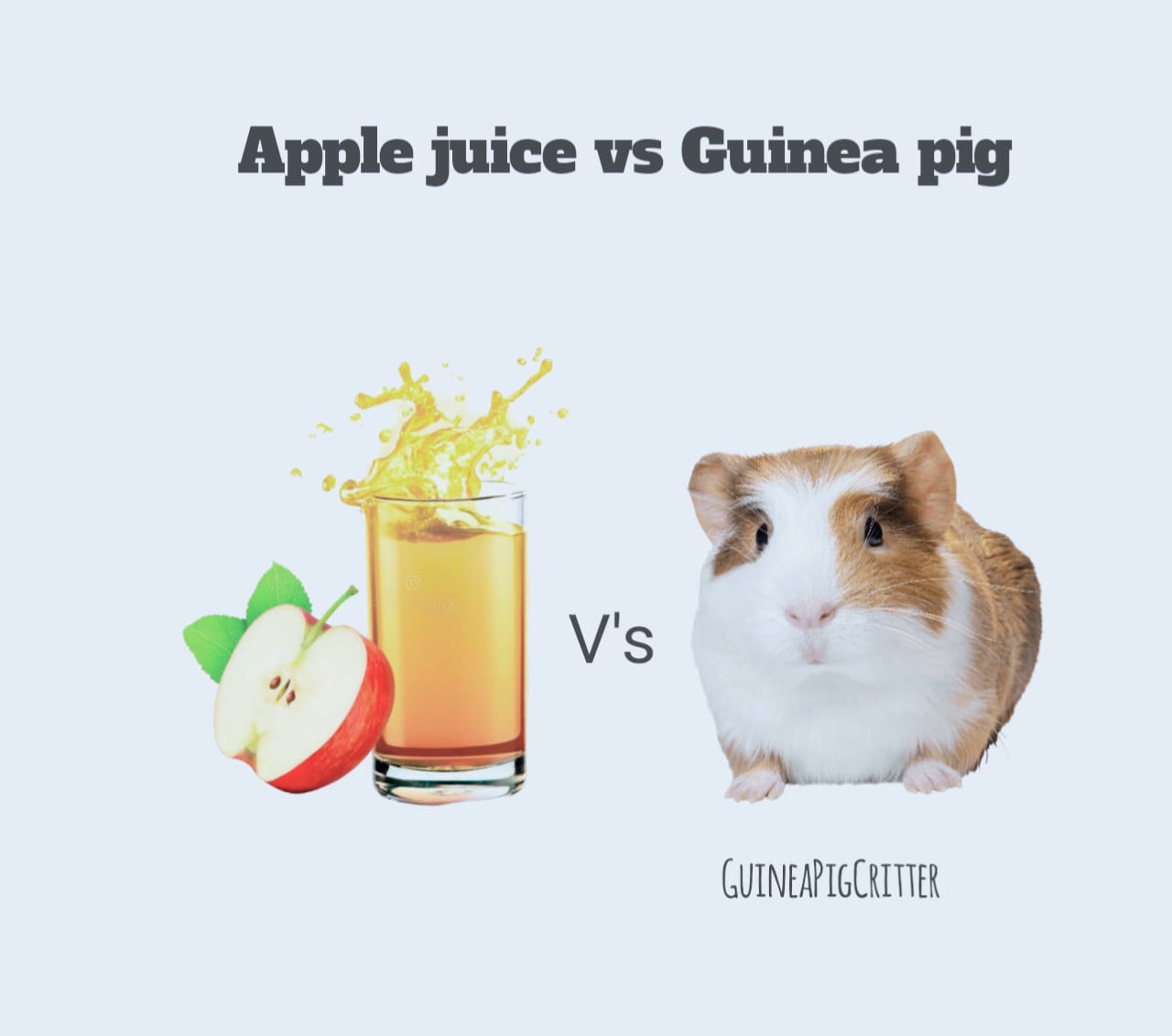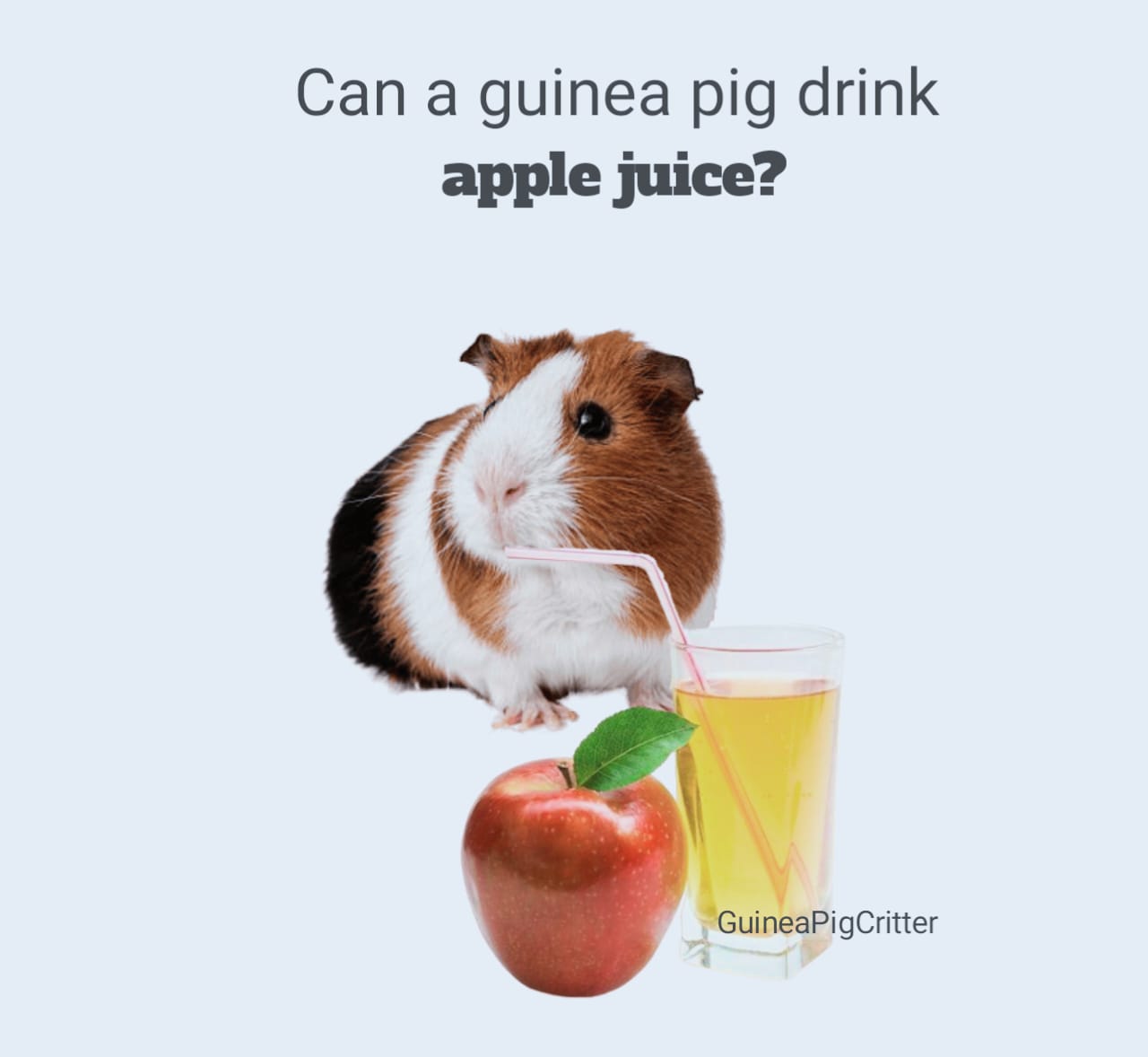Guinea pigs are cute, sweet, and easy-to-care-for pet. It is no secret that these small furry animals are vegetarians but do have special requirements when it comes to what they can eat and drink, and as responsible guardians, we have to ensure to provide them with correct food and liquids.
One of the most commonly asked questions by the guinea pig owners is whether their pets can have apple juice. After all, apple juice as a drink is a healthy natural drink for humans so it is also expected that it can be shared with guinea pigs.
The short answer is no – guinea pigs should not be given apple juice.
There is nothing wrong with giving apples to pigs, but the juice comes with some health complications. In this article, we will explain why guinea pigs should not be drinking apple juice, asses the nutritional requirements of guinea pigs, and recommend safer options that would complement their nutritional requirements.
Knowledge of the Diet of Guinea Pigs
But before going to the point of discussing apple juice in particular, it is salient to mention certain nutritional characteristics that guinea pigs have. These small creatures are in need of a high-fiber and high-water and vitamin C diet. They have fragile digestive systems as well, and therefore require an unlimited amount of hay and fresh greens, as well as clean water, to function well.
High Fiber Requirements
Almost all the food in a guinea pig’s diet should be comprised of hay. The roughage present in hay assists in keeping their constant growing tooth trimmed and even helps keep their gut healthy. Hay can always be supplied to them.
Vitamin C
Vitamin C is such an excellent vitamin especially for a plethora of animals, It, however, deters guinea pigs as they do not synthesize it which means they will get it from food. In guinea pigs, Vitamin C is crucial because lack of it may result in a dangerous disease referred to as scurvy which affects the bones and the ability to fight diseases. Thus we need to give them vegetables which have high vitamin C content such as bell peppers, kale, and parsley.
Water
Clean and clear water must be provided to guinea pigs on a regular basis every day. Lack of adequate water can lead to quick health complications while on the other hand water is important in helping in digestion, body heat control and general wellbeing.
So due to these specific needs, the guinea pigs see no need nor is there any benefit in consuming sugar or processed foods. Then how exactly does apple juice come in this picture?
Also Read This Post - is guinea pig eat cheese?
Natural Sugars and Guinea Pigs: A Delicate Balance
Guinea pigs are naturally herbivorous animals, meaning they are omnivorous and primarily consume plant materials. However, not all plant foods are safe for them, simply because they are plants. For example, although guinea pigs can have apples in moderation because it contains natural sugar, it should be kept to a minimal amount. Even though such a sugar may be natural, the quantity still needs to be controlled in a guinea pig’s diet.
How Guinea Pigs Do Away With Sugar
Guinea pigs cannot endure great amounts of sugar in their diet because they have a very sensitive digestive sofa. Too much sugar in the diet may lead to obesity and various digestive complications including diabetes. In the wild, the normal diet of guinea pigs comprises grasses and leaves, which are low on sugars and high in crude fiber. They never evolved to cope with the high sugar content present in fruit juices.
The Effects of Too Much Sugar: The habit of feeding sugary fruits and other juices to guinea pigs can disrupt the balance of bacteria normal in a guinea pig’s stomach. This imbalance can manifest itself in such gastrointestinal upsets as bloating, diarrhea and gas. Later on, a sugar rich diet can also give rise to obesity in guinea pigs, together with all the associated problems such as diabetes and cardiovascular diseases which are real dangers for these animals.
What’s inside Apple juice?
Apple juice, especially the type sold in the grocery stores, is loaded with sugar even if it’s called ‘natural’ or ‘no added sugar’. Juicing makes juicing devoid of the bulk of the fiber present in any fruit and basically consists of water, sugars, and a bare minimum of vitamins and minerals. Let’s breakdown:
Sugar Content: It is estimated that a standard glass of apple juice will have a sugar level around 24 grams. And for some context, imagine swallowing some six teaspoons of sugar! For a small animal like a guinea pig, even a pea sized lump of this sugar trumps them and causes gastric problems almost instantly.
Fiber: For instance, whole apples rather than apple juice contain dietary fiber which is one of the reasons as to why their nutrition value is better than apple juices. The fiber assists to prevent the rapid sudden increase of the sugar levels in body especially after the ingestion of sugar rich foods. With the juicing of apples the fiber from the apples is completely removed leading to pure sugar water that is rapidly absorbed into blood and causes sugar spikes in guinea pigs.
Additives: As with a lot of other store fruit juices, preservatives, artificial flavorings and other additives which are dangerous to guinea pigs natural foods are found in these juices. Even if the label states “100% pure juice”, the sugar levels and the absence of fiber tissue is not suitable for them.
Also Check - Can a guinea pig drink orange juice?
Can Guinea Pigs Drink Apple Juice?
So, can apple juice be offered to guinea pigs? The answer is a resounding no. Rather even though apple juice is a fruit juice extract, it should be avoided by guinea pig’s population. Here are a few key reasons why:
High Sugar Content: As mentioned earlier, apple juice contains far too much sugar for a guinea pigs’ digestive system. That is intake of sweetened beverages lead to elegant, immediate upset in the digestive system and profusely sugary drinks have put individuals at a greater risk of obesity, diabetes among other ailments.
Lack of Fiber: They require fiber to be able to maintain healthy insides. That apple juice does not contain fiber means that there is no benefit that can be derived from eating whole apples. Instead, it can elevate blood sugar among other problems.
Risks Involved With Allowing Guinea Pigs into Drinking Apple Juice
The health issues involved when one feeds guinea pigs with apple juice should however not be taken lightly. Let us examine some of these concerns in detail:
Obesity: There is a danger with guinea pigs developing excessive weight when there is high sugar consumption within the animals. Obesity is not a health complication in guinea pigs only as the animal itself suffers from a number of health issues including heart ailments, joint pains and on top of other depreciated life expectancy.
Diabetes: Just like people, guinea pigs are prone to diabetes due to high sugar intake. It is important to point out that diabetes in guinea pigs is quite hard to deal with, and it greatly reduces the health condition in this animal.
Digestive Problems: The sugars ‘simply’ destroy the bacterial equilibrium in the guinea pig’s intestines and diarrhea, gas, and/or bloating may result. Juices can settle such stomach and stomach problems in these animals. But only rarely should the medication contain more than a gram of that juice. Tooth Decay: Due to high levels of sugar content in apple juice, another consequence is tooth decay. While at the same time, because guinea pigs teeth grow continuously all through life, the sugary liquids will induce plaque formation and bacteria activity resulting in dental problems.
Healthier Alternatives for Guinea Pigs
If you’re searching for and considering ways to treat a guinea pig as a pet, there is a lot of healthy apple juice alternatives that will not harm the pet. Below are some examples of them:
Moderate amounts of fresh apples: If you are thinking of sharing an apple with your guinea pig, rather than apple juice, little bits of the actual fruit itself would be the better option. This is due to the fact that apples have fiber which prevents sugar from being absorbed quickly. Even so, fresh apples too should be fed in moderation – too much fruit is still fruit and can result in other digestive issues.
Vegetables: Green foliage and other types of vegetables are way better than sweet feed for guinea pigs. Such leafy greens include kale, bell peppers, cucumber just to mention but a few is a good provision for vitamin C without including sugar that is seen in fruits. Wash vegetables and then present them to your pet.
Herbs: Guinea pigs can also enjoy fresh parsley, fresh cilantro, or fresh basil as a healthy and nutritious snack. These herbs are full of vitamins and other nutrients but low in sugar content hence can be incorporated into a guinea pig’s diet.
Water: Fresh water is the most ideal drink you can provide to your guinea pig even though it may not sound appealing to us. Always let your guinea pig have access to clean fresh water for his or her proper hydration since that is very important for healthy pets.
Conclusion
To sum it up, apple juice is not right for any guinea pig. It may look good on humans, however for guinea pigs, its high sugar content and lack of fiber make it a dangerous drink as well. The small creatures also have a compromised digestive system as such so treats such as apple juice are likely to bring about scary health complications such as obesity or diabetes, or digestive problems amongst others.
In taking care of your pet guinea pig, one must ensure that they adhere to a feeding schedule that helps in meeting their dietary needs as a pet. The main diet should consist of dry leaves, clean water, and some green vegetables with fruits such as apples being treats for the guinea pigs every now and then. A diet free of harmful substances and excess treats will lead your guinea pig to live an active, healthy and long life.


